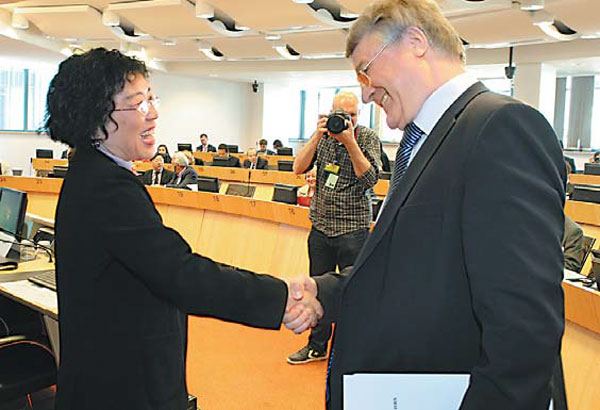Grand-plan synergy
Updated: 2015-06-26 06:35
By Fu Jing and Martin Banks(China Daily Europe)
|
|||||||||||
|
Chinese Ambassador to the EU Yang Yanyi greets Markku Markkula, president of the European Committee of the Regions, at a seminar on China's investment in the EU. |
"It is critical for both China and Europe to find ways to collaborate bilaterally as well as internationally, and the recent initiatives testify that both sides are intent on developing forms of collaboration they think will be mutually beneficial."
A senior European Commission official, who did not want to be identified, says the EU and China are looking at the possibility of China playing a role in the 315-billion-euro investment plan from now until 2017.
"In the context of the investment plan for Europe, the commission has been contacted by stakeholders from outside Europe, including China, but no concrete figures or proposals have been presented."
The commission looks forward to continuing the dialogue with all interested parties, she says.
The official says that in principle China and other third parties can contribute in three ways to the investment plan: Through the European Fund for Strategic Investments, through an investment platform, or through individual projects.
At a recent seminar in Brussels organized by ChinaEU and jointly sponsored by China Daily, participants said the 315-billion-euro investment plan presents a great opportunity for Europe and China to work more closely together and for Chinese investment in the EU to be given a fillip.
The seminar, titled "China, the digital economy and the EU investment plan", was hosted by the Committee of the Regions, the EU's assembly of regional and local representatives, and aimed a finding a breakthrough for China and the EU to coordinate their economic agendas.
At the heart of the EU investment plan, which Juncker unveiled in November, is a fund of 21 billion euros that would provide loans for infrastructure projects. Juncker hopes most of the rest of the money will come from private backers. Only 16 billion euros of the original money would come from the EU budget.
However, skeptics doubt that it can attract so much private investment, which is where China comes in.
The seminar in Brussels was told that the Chinese contribution can be both financial, thanks to the support of Chinese banks, and technological, thanks to the support of the Chinese information and communications industry. Representatives of the four biggest Chinese banks - ICBC, China Construction Bank, Agricultural Bank of China and Bank of China - attended the seminar.
He Liqin, president of Bank of China Brussels, says that with the 315-billion-euro investment plan, information and communications companies and related industries "will have many opportunities" to help accelerate growth of the European economy.
"We also believe Chinese financial institutions and companies will have many opportunities to participate in this plan."
Between the Juncker plan and the Belt and Road initiative, whose aim is to create a northern road corridor to connect China and Europe, there are huge untapped synergies, the seminar was told.
Bank of China will invest about $100 billion (88.7 billion euros) in the Belt and Road Initiative, He says, adding: "We will also do our best to find a way to support Juncker's giant investment plan for Europe."
One of the ways it can do this, she suggests, is to work with Chinese investment agencies and act as an intermediary between Europe corporate and financial institutions.
"Finance for the Juncker plan is open to all qualified entities, but the financing sources could vary widely. We will recommend projects and promote involvement in this plan."
Her comments are echoed by Yang Yanyi, head of the Chinese mission to the EU, who says the Juncker plan and China's initiative offer a "unique chance" to strengthen "strong synergy and tap the full potential" to create new products, services, sectors and job opportunities.
Yang told the seminar that China was shifting its economy away from a manufacturing-driven export model to an innovation-oriented one.
Indeed, China had launched its own Silicon Valley, the Zhongguancun Haidian Science and Technology Park in a Beijing street called Inno Way, she said.
"Inno Way is just 10 minutes from where I live, and I have personally witnessed how a street filled with teahouses, hairdressers and groceries has been transformed into an innovation hub filled with innovation startups and service institutions aspiring to become a global center of innovation by 2020."
Related Stories
Easy answer for European job creation 2015-06-26 06:35
Europeans need to take Silk Road express 2015-06-26 06:35
Digital connections will deepen EU-China ties 2015-06-26 06:35
Today's Top News
EU, China must turn words into deeds
Greek doors are open to investment
Gunmen kill 27 in attack on Tunisian coastal resort
China opposes Dalai Lama UK appearances
Severed head found in French attack
France orders nationwide clampdown on Uber
No rest until sweeping victory against drugs, Xi says
High-tech seen as promising investment target
Hot Topics
Lunar probe , China growth forecasts, Emission rules get tougher, China seen through 'colored lens', International board,
Editor's Picks

|

|

|

|

|

|







